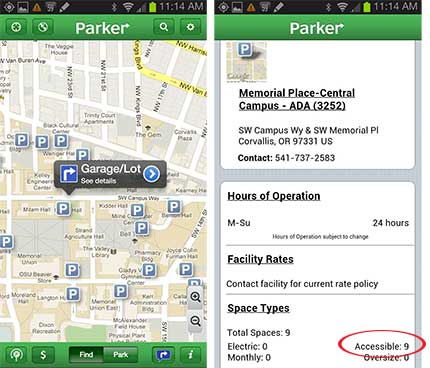Oregon State Brings Smart Sensors to Accessible Parking
Oregon State University has started using smart parking technology to provide automated, real-time data on the availability of accessible parking campuswide through mobile devices.
The Corvallis, OR-based institution is using Streetline's free Parker app (available for Android and iOS) to make real-time parking data available to students, employees, and visitors. According to OSU, over the winter break, the university installed sensors specifically in accessible parking spaces for two purposes: first, to help motorists find accessible spaces more easily; second, to help campus staff monitor accessible parking to ensure such parking is available whenever it's needed.

Screen shots of the free Parker app (Android version) showing Oregon State University's parking lots and available spots. The shot on the left shows the location of lots and garages; the shot on the right displays data about the lot and the available spots, including the number of accessible parking spots currently available. |
"At Oregon State we value diversity, and this project demonstrates our commitment to providing access for individuals of all ages and abilities," said Jennifer Gossett, OSU disability access services coordinator, in a statement issued by the university. "This technology will also benefit all commuters to campus who will now have access to an interactive map and parking information through their smartphone devices and the web."
The smart sensors are installed exclusively in accessible parking spaces, making OSU's implementation unique, according to the university. (Other institutions use the sensors in both accessible and non-accessible parking spaces.) The sensors themselves are low-power wireless devices currently placed in 75 of the university's accessible spaces, covering 30 buildings.
Data on non-accessible spaces is shared with the public, but not using sensors. Instead, the university is updated the status of those spaces through Streetline's ParkEdge, a Web-based tool that lets institutions manage spaces; publish information on rates, hours, and locations; and manage reservations.
Oregon State University serves more than 26,000 students and offers 250 undergraduate and graduate degree programs through classroom instruction and another 30 through its online program, OSU Ecampus.